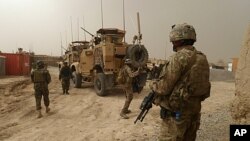Afghan and NATO authorities are continuing to investigate the actions of a U.S. soldier accused of killing 16 Afghan civilians and then setting many of the bodies on fire on Sunday. While no major protests over the incident occurred on Monday, authorities worry it could further fuel public opposition to foreign troops.
Villagers who witnessed the attack in the Panjwai district of Kandahar province say they saw a U.S. soldier shooting the victims, many of whom where women and children, as they slept. Some of the bodies were also partially burned indicating that the perpetrator set them on fire.
One man who lost his family explained to reporters what happened.
He says as he started to fire a dog ran toward him and he shot the dog, then he entered the house, rounded all family members in one room and martyred all of them.
President Karzai called the attack, “an assassination, an intentional killing of innocent civilians and cannot be forgiven.” President Barack Obama called the attack "tragic and shocking" and not representative of "the exceptional character of the U.S. military.
Listen to analysis by South Asia expert Taj Hashmi
Brigadier General Carsten Jacobson, spokesman for NATO's International Security Assistance Force, says the shootings in Kandahar are being investigated as a murder, and not part of any military operation. “Those who suffered as innocent citizens of Kandahar are not civilian casualties from military activity, they are victims,” he stated.
U.S. officials identified an army staff sergeant as the shooter and said he acted alone. But some villagers and Afghan officials are skeptical that one soldier could have amassed such a death toll on his own, and others may haven been involved.
Afghan President Hamid Karzai also raised doubts in a statement in which he at first confirmed that a single U.S. gunman was responsible but later referred to “American forces” entering houses.
There is great concern that the incident could fuel public outrage similar to last month’s inadvertent burning of Qurans at an American military base. That led to a week of violent protests, as well as attacks against U.S. forces and the killing of two American officers in the interior ministry. Afghans have spread rumors that Sunday’s attacks were retribution for those deaths.
General Jacobson said there is no evidence that the Kandahar attack was linked to any past attacks against U.S. soldiers, but did not disclose the soldier’s possible motive. He urged the public to allow investigators to do their work and not engage in speculation.
“Beliefs and rumors are always a bad guidance. And we have seen and heard enough beliefs and rumors yesterday, as the story becomes clearer and clearer to us at this moment and has to become clearer in coming days,” Jacobson said.
The Taliban released a statement that vowed revenge for the killings.
The shooting comes as U.S. and Afghan authorities negotiate the transfer of security responsibilities to Afghan forces. The two sides already signed off on a deal to transfer full control of an American detention facility to Afghanistan in six months, and now hope to develop a broader strategic partnership agreement before the May meeting of NATO in Chicago. That agreement is expected to define the U.S role in Afghanistan after the withdrawal of most of its 98,000 combat soldiers in 2014.




